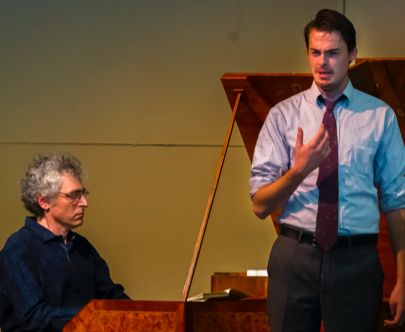|
Symphony
FROM THE NEW WORLD TO THE OLD WORLD
by Peter Lert
Saturday, June 14, 2025
Chamber
MC2 DUO RECITAL CLOSES 222'S SEASON
by Terry McNeill
Saturday, June 14, 2025
Choral and Vocal
CANTIAMO SONOMA'S LUSCIOUS A CAPELLA SINGING IN SEASON ENDING CONCERT
by Pamela Hicks Gailey
Sunday, June 8, 2025
Symphony
SRS SEASON ENDS WITH RESOUNDING TA-TA-TA-BANG
by Terry McNeill
Sunday, June 1, 2025
Symphony
YOUTHFUL VIRTUOSITY ON DISPLAY AT USO'S MAY CONCERTS
by Peter Lert
Saturday, May 17, 2025
Symphony
MYSTICAL PLANETS AND LIVELY GERSHWIN ORTIZ AT FINAL SRS CONCERT
by Peter Lert
Sunday, May 4, 2025
Symphony
VSO'S CONCERT MUSIC OF TIME, MUSIC OF PLACE
by Peter Lert
Sunday, April 27, 2025
VOCAL ELEGANCE AND FIRE AT THE 222'S RECITAL APRIL 26
by Pamela Hicks Gailey
Saturday, April 26, 2025
CANTIAMO SONOMA SINGS AN INSPIRED GOOD FRIDAY MOZART REQUIEM CONCERT
by Pamela Hicks Gailey
Friday, April 18, 2025
DRAMATIC SHOSTAKOVICH SYMPHONY CLOSES PHILHARMONIC'S 25TH SEASON
by Terry McNeill
Sunday, April 13, 2025
|
 |
 Pianist Erick Zivian and Tenor Kyle Stegall (John Hefti Photo) |
FINAL VOM MUSICIANS CONCERT IN SCHROEDER A SCHUBERT DELIGHT
by Terry McNeill
Saturday, May 12, 2018
It's rare to have the opportunity to compare in a short period two performances of the same major Schubert work, in this case the great B Flat Piano Trio, D. 898. The chance came May 12 when the Valley of the Moon Festival musicians played it in Schroeder, just over a month since the Hall’s resident Navarro Trio gave a compelling reading of the work from 1827.
Surprisingly, the differences were greater than the similarities. The estimable Navarro uses a modern concert grand and the violin and cello are fitted with steel strings. The VOM trio uses a piano from Mendelssohn’s era, and the bowed instruments have gut or synthetic strings. Many feel these types of strings have a dark and richer sound than steel-core strings, but there is seldom a consensus from listeners. Also there are seasoned music lovers that are not enamored of the period piano sound.
Violinist Joseph Maile took the place of the frequently performing VOM violinist Monica Huggett, and with pianist Erick Zivian and cellist Tanya Tomkins the Op. 99 work unfolded with Schubertian exuberance and brisk tempos. From the usual critic’s seat way back in Schroeder the cello and piano lacked projection and distinct instrumental lines, and no treble partials could be heard from the piano. So different from the Hall’s modern pianos. I’ll sit closer next time music is played with a small ensemble of period instruments, and presumably hear more.
A highlight of the performance came in the andante un pocco mossowhere the majestic theme first stated by Ms. Tomkins was heartfelt and spiritual, and her duos with Mr. Maile were splendid, with delicacy foremost. The scherzo received a reading more intimate than experienced in most Schubert scherzos, and the finale rondo allegro underscored fetching folk-song melodies.
Tenor Kyle Stegall and Mr. Zivian performed an extended group of Schubert songs, with a short Schumann piece, that constituted the entire first half. Mr. Stegall has sung at the VOM summer festivals and has a penetrating, elastic and clear tenor but at this recital lacked the round warm sound of iconic German lieder tenors. The opening Geheimes (D. 719) was perfection, with deft swelling on individual notes, and morphed into the furious tempo of Versunken, D. 715. The singer had the score but infrequently glanced at it, preferring to animate each song with varied facial expression and change in tone color. The postlude to a low piano note in Versunken was lovely.
These songs were written on Goethe’s poetry, and are less familiar than the popular Die Winterreise and Die Schöne Müllerin cycles. But sonic and dramatic contrasts were everywhere present in this masterful recital, from the slow and hesitant Erster Verlust (D. 226) and the stentorian Freudvall und Liedvoll, D. 201, to the chaste Nahe des Geliebten (D. 162) with different but mesmerizing repeats and phrases sung at half voice.
In the next section the performance of An Schwager Kronos (D. 369, and a Fischer-Dieskau specialty) was echt Schubert singing, and Liebhaber in allen Gestalten (D. 588) had more sonority than any song before, with refined rubato playing from Mr. Zivian.
Of course the performance of the famous Erlkönig (D. 328) generated excitement for the audience of 100, as the drama mounted in each of the eight stanzas and Mr. Zivian’s fast repeated chords hammered out perfect support for the tragic story of the fleeing child dying in his father’s arms. Mr. Stegall looked furtively around the stage during the increasing vocal histrionics, giving vocal emphasis (shrill at moments) to the story’s interplay of speeding horse, two riders and approaching lethal menace.
No encore was offered.
|

